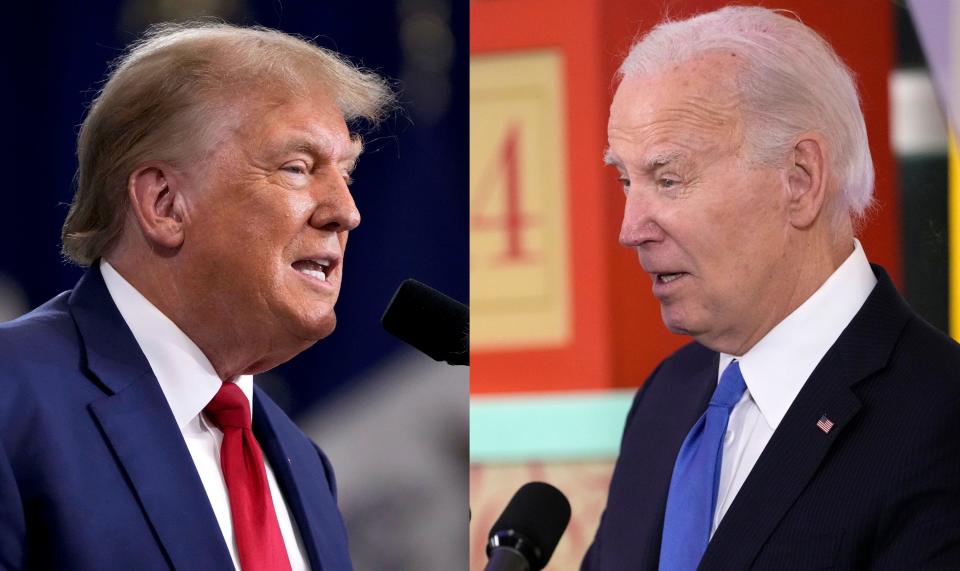Will Biden or Trump win 'double haters'? Unhappy voters may decide 2024 election.
Former President Donald Trump and President Joe Biden are all but assured the 2024 presidential nomination from their respective parties. There is a lot of say about key voting groups ? such as will young Americans turn out to vote for Biden, or will suburban women move toward Trump?
One important voting group we will be watching is voters who are unfavorable toward both Biden and Trump. These “double haters” or “double unfavorables” show significant volatility, questionable turnout and a keen interest in third-party candidates.
They will be an essential group to understand and haven’t been discussed enough. We have never seen an election like the upcoming 2024 contest, and this group is one of many reasons why.
The latest Marquette University Law School national survey pegs this group as 17% of the electorate, which is nearly identical to the share of voters in 2016 who disliked both Hillary Clinton and Trump. Trump ended up winning this group, which broke toward him in the late stages of the campaign and may have been a key factor in his victory.
In 2020, however, just 3% of voters had an unfavorable opinion of both Biden and Trump, according to exit polling. Trump has managed to win votes among people who say they don’t like him as a person, but winning among people who dislike him is new terrain for Biden.
In case you missed it: Biden may sign a Trump-esque immigration executive order. It won't fix our border crisis.
Who will win these double haters in November? Well, it’s not certain that either Biden or Trump will. In fact, in the latest national polls from Quinnipiac University, Marquette University and Morning Consult, Robert Kennedy Jr. wins a plurality among those who dislike both Biden and Trump.
However, Kennedy still has the hurdle of qualifying to make it on states' ballots, although last week supporters announced enough signatures for him to qualify in the key battleground states of Arizona and Georgia.

But beyond access, he is still largely a persona rather than a well-known candidate. Many voters assume positives about RFK Jr. based on his family name and mistake him for his father. They don’t yet know a lot about his views on policy (or vaccines).
Of course, there are other third-party candidates to consider, including who ends up as the standard-bearer for the self-identified centrist group No Labels.
Biden does better among 'double unfavorables'
Much has yet to shake out, however. If the choice is just between Biden and Trump or “someone else,” Biden has a double-digit advantage among those who dislike them both, according to recent national polls. Biden’s lead with double unfavorables in the recent Marquette poll is the highest it has ever been with this group.
It may be that the reasons for disliking Biden are more negotiable than the reasons for disliking Trump. In recent Morning Consult data, about two-thirds of this group said they would be very unwilling to vote for Trump if he were convicted of a crime.
Face it: Biden, Trump win Michigan. Can the media wake me when the general election starts?
Or it could be that this group, while lumped together as double haters, simply somewhat dislike Biden but strongly dislike Trump and, at the end of the day, they pick the one they dislike least.
Interestingly, there seem to be roughly equal numbers of Democrats and Republicans in this group of double haters, although many are independents who may voice their displeasure by voting for a third-party candidate. This group is not distinctive from the general electorate in gender or education. They do, however, tend to be slightly younger, less white and slightly more Hispanic than the general electorate.
Opinion alerts: Get columns from your favorite columnists + expert analysis on top issues, delivered straight to your device through the USA TODAY app. Don't have the app? Download it for free from your app store.
Factoring in this group’s affinity for options other than Trump or Biden, third-party candidates tend to poll higher than what their actual support ends up being on Election Day.
Even so, with the very small margins (between 10,000 and 21,000 votes) that separated the candidates in 2020 in key states like Arizona, Georgia and Wisconsin, even single digit support for third-party candidates from “double haters” could swing the election.
'Double haters' may skip voting in 2024
Double haters also could decide not to vote. In fact, who does and doesn’t vote will matter a lot in 2024, and both the Biden and Trump campaigns will be highly attuned to making sure their supporters turn out and to making the case to the double haters to give them the benefit of the doubt.
These double-unfavorable voters need to be given something to vote for, not just something to vote against. They are focused on the economy, especially the cost of living and health care.
About half of this group don’t trust anyone to handle the issues they care about, but when it comes to the economy, they are similar to the electorate overall in giving Trump a significant advantage over Biden.
While Biden leads with this group across recent polling, if they continue to perceive a significantly worsening economy, that could be Trump’s opening with these voters.
Celinda Lake, president of Lake Research Partners, was one of two lead pollsters for Joe Biden's 2020 presidential campaign. She also is a pollster for the Democratic National Committee. Christine Matthews, president of Bellwether Research, is a leading public opinion pollster known for her understanding of swing voters, particularly women.
You can read diverse opinions from our Board of Contributors and other writers on the Opinion front page, on Twitter @usatodayopinion and in our daily Opinion newsletter.
This article originally appeared on USA TODAY: Trump or Biden? Dissatisfied voters may decide who wins
